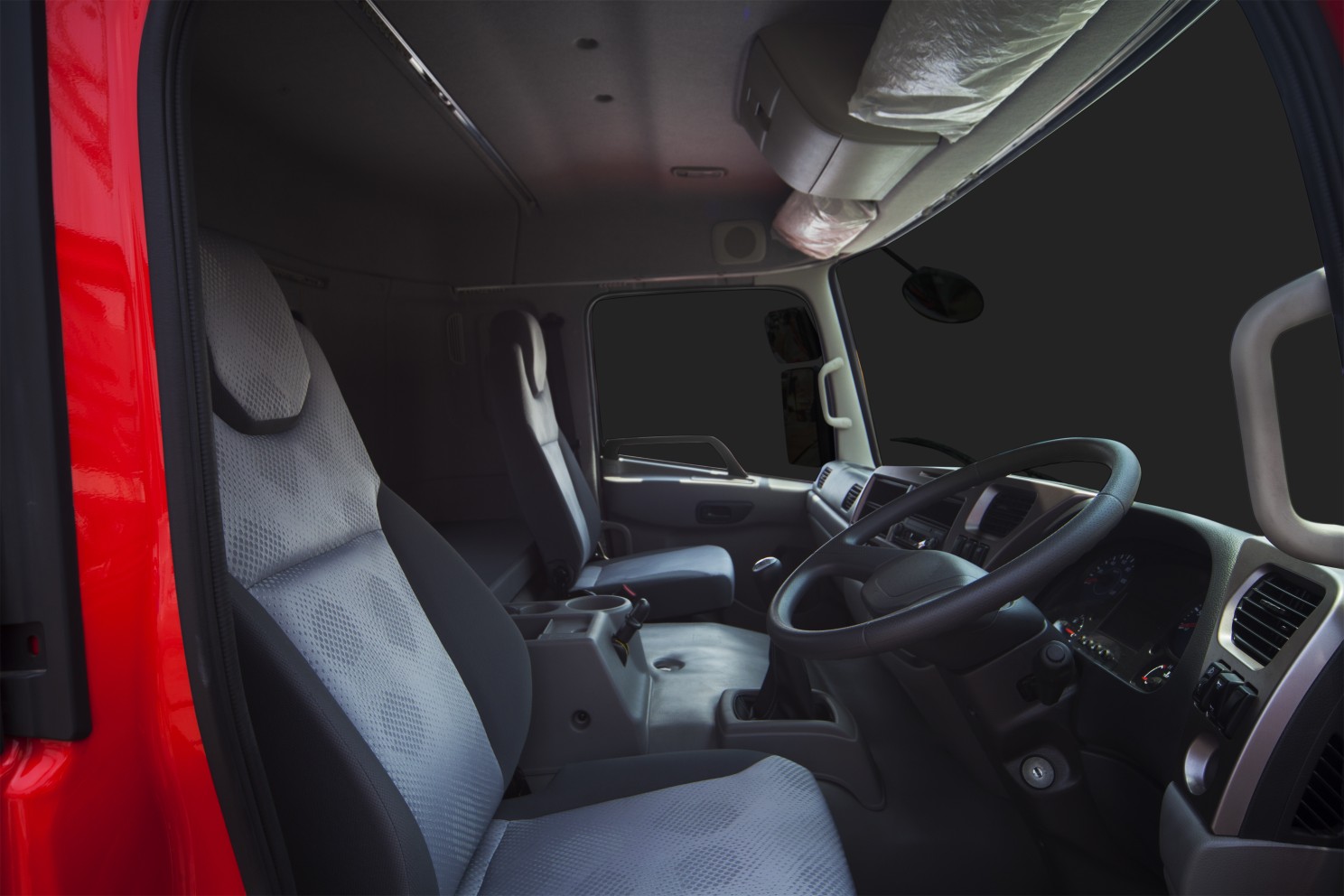
Susie Jones
Fünf Top-Tipps, damit Ihr Lkw-Fahrerhaus ein Zuhause wird
Erstellt: 22.08.2024
•
Aktualisiert: 22.08.2024
Als Lkw-Fahrer verbringt man viele Stunden auf der Straße, was oft ermüdend und eintönig sein kann. Daher möchte man natürlich, dass sich die Umgebung, in der man am längsten stationiert ist, wie ein zweites Zuhause anfühlt. Deshalb neigen viele Fahrer dazu, ihre Kabinen individuell zu gestalten und zu dekorieren. Aber wie kann man sein Schlafwagenabteil am besten einrichten, damit es sich wie ein zweites Zuhause anfühlt? Wir haben fünf Top-Tipps zusammengestellt, die Ihnen dabei helfen.
Dekoration
Eine der besten Möglichkeiten, Ihr Taxi zu personalisieren, ist die Dekoration, die Sie an Ihr Zuhause erinnert. Mit Dekorationen können Sie auch Stil und Farbe ins Spiel bringen.
Bettwäsche und Kissen - Verleihen Sie Ihrer Bettwäsche und Ihren Kissen eine persönliche Note, indem Sie eine Farbe oder ein Muster wählen, das Ihnen gefällt. Das kann Ihre Kabine gemütlicher und weniger stagnierend machen.
Sitzbezüge - Sitzbezüge gibt es oft in verschiedenen Farben, Mustern und Materialien, die Ihr Fahrerhaus beleben. Sie machen das Fahrerhaus nicht nur einladender, sondern schützen den Innenraum auch vor Abnutzung, Schmutz und Flecken. Bei Amazon finden Sie in der Regel eine große Auswahl an Farben.
Teppiche, Vorhänge und Schattierungen - Die Auswahl einiger Teppiche und Vorhänge kann das Innere Ihrer Kabine verändern. Die Vorhänge sorgen nicht nur für eine ästhetische Aufwertung, sondern helfen Ihnen auch dabei, eine angenehme Nachtruhe zu finden.
Fotos, Poster und Kunstwerke - Diese Gegenstände nehmen nicht viel Platz in Ihrer Kabine ein und können dafür sorgen, dass Sie sich sofort wie zu Hause fühlen. Verwenden Sie Kommando-Haken für eine beschädigungsfreie Anbringung.
Unterhaltung: Entspannen Sie sich am Ende Ihres Fahrtages wie zu Hause, indem Sie fernsehen, eine DVD ansehen oder etwas auf Ihren Laptop streamen. Für das Streaming benötigen Sie WiFi. Informieren Sie sich auf unserer [Kartenseite] (https://snapacc.com/map/), welche Haltestellen diesen Service anbieten.
Alternativ können Sie einen Smartphone-Hotspot einrichten, der die Daten Ihres Telefons für das Streaming nutzt. Bücher und Zeitschriften sind eine weitere gute Möglichkeit, um sich nach einem langen Tag im Auto zu unterhalten. Manchmal kann auch ein einfacher Videoanruf mit Freunden oder der Familie für Entspannung sorgen und Ihnen das Gefühl geben, zu Hause zu sein.

Komfort
Sie verbringen viel Zeit in der Kabine, daher ist es wichtig, dass Sie auf Ihren Komfort nicht verzichten. Investieren Sie deshalb in Folgendes:
Matratzenauflage - Eine gute Nachtruhe ist für Ihre Sicherheit und die Sicherheit anderer entscheidend. Die Investition in eine gute Matratzenauflage sorgt dafür, dass Sie einen bequemen Schlafplatz haben.
Ergonomischer Fahrersitz - Die meiste Zeit werden Sie auf dem Fahrersitz verbringen, daher ist es wichtig, dass dieser so bequem und stützend wie möglich ist. Investieren Sie in einen ergonomischen Fahrersitz oder ein Kissen, das Ihren Rücken während der langen Stunden stützt.
Zusätzliche Kissen und Decken - Wie bereits erwähnt, kann der Kauf von Bettwäsche und Kissen in einer Farbe oder einem Muster, das Ihnen gefällt, Ihr Fahrerhaus noch mehr wie ein Zuhause wirken lassen. Ziehen Sie den Kauf zusätzlicher Kissen und Decken in Erwägung, um dem Fahrerhaus eine noch persönlichere Note und maximalen Komfort zu verleihen.
Küchenbereich/Geräte
Wenn Sie einen Mini-Kühlschrank oder eine Mikrowelle in Ihr Fahrerhaus einbauen, können Sie Ihre Mahlzeiten wie zu Hause zubereiten und sind nicht mehr auf Raststätten und Restaurants angewiesen. Wir empfehlen Ihnen, sich zu überlegen, welche Geräte Sie in diesem Bereich benötigen. Wenn Sie beispielsweise gerne Kaffee trinken, sollten Sie sich eine kleine Kaffeemaschine zulegen. Wenn Sie Ihren Küchenbereich und Ihre Küchengeräte nutzen, müssen Sie nicht nur kein Vermögen für auswärtiges Essen ausgeben, sondern können auch Ihre allgemeine Gesundheit verbessern.
Halten Sie alles sauber und aufgeräumt
Das Leben auf engem Raum kann sehr schnell unordentlich werden. Wenn Sie Zeit und Mühe in eine regelmäßige Reinigungsroutine investieren, kann das Wunder für Ihre geistige Gesundheit bewirken und Sie in die Lage versetzen, effizienter und effektiver zu arbeiten. Wenn Sie dafür sorgen, dass Sie spezielle Bereiche für Ihre Gegenstände haben, wird dies hilfreich sein, und ProDrivers hat einige ausgezeichnete Tipps, wie Sie alles organisiert halten können.
Wie gehen Lkw-Fahrer mit Langeweile um?
Langeweile wirkt sich nicht nur auf die Arbeitszufriedenheit aus, sondern kann auch die Arbeitssicherheit beeinträchtigen. Es gibt viele Möglichkeiten für Lkw-Fahrer, sich auf der Straße zu unterhalten.
Musik und Podcasts: Musik ist ein hervorragendes Mittel, um Autofahrer während langer Fahrten zu unterhalten. Wenn Sie eine Wiedergabeliste mit Ihren Lieblingssongs erstellen, wird es nicht so schnell langweilig. Podcasts sind eine tolle Abwechslung. Viele von ihnen bieten Ratschläge, helfen beim Erlernen einer neuen Fähigkeit oder unterhalten einfach.
Die Beine vertreten: Wenn Sie anhalten und aussteigen, um sich die Beine zu vertreten, vergeht die Langeweile sofort. Regelmäßige Stopps können auch Ihre Energie steigern.
Wo schlafen Lkw-Fahrer?
Seit dem 1. November müssen Lkw-Fahrer im Vereinigten Königreich, die regelmäßig wöchentliche Pausen in der Kabine einlegen, diese nun auf richtigen Rastplätzen einlegen. Da es nur wenige davon gibt, haben einige Fahrer ihre Ruhezeit auf Rastplätzen verbracht, die oft unsicher sind. Deshalb ist es wichtig, einen sicheren und ruhigen Platz zu finden, an dem man sich ausruhen kann. Mit unserer intruck-App oder auf unserer [Kartenseite] (https://snapacc.com/map/) können Sie einen Lkw-Parkplatz in Ihrer Nähe finden und sich über die dortigen Einrichtungen informieren.
Wie gehen Lkw-Fahrer mit Einsamkeit um?
Der Beruf des Lkw-Fahrers hat zwar viele Vorteile, aber eine der Kehrseiten der Branche kann die Einsamkeit sein. Das kann für viele Fahrer ein Problem sein, die sich durch die Art ihres Jobs isoliert fühlen. Pläne zu schmieden, um mit Freunden und Familie in Kontakt zu bleiben, kann den Fahrern auf der Straße einen Schub geben. Trucking-Foren, Facebook-Gruppen und Chat-Rooms sind ideal, wenn Sie Teil der Trucking-Community werden wollen. All Trucking hat einige fantastische Tipps, die Ihnen helfen, die Einsamkeit als Trucker auf der Straße zu bekämpfen.
Damit Sie sich in Ihrem Lkw-Fahrerhaus wie zu Hause fühlen, bedarf es etwas Mühe und Kreativität, aber die Vorteile, die sich daraus ergeben, werden Ihre langen Fahrten um einiges erleichtern. Es ist wichtig, daran zu denken, dass kleine Details einen großen Unterschied in Ihrem Lebensraum ausmachen können, und mit den oben genannten Tipps können Sie ihn komfortabel und einladend gestalten. Wie schaffen Sie es, dass sich Ihr Taxi wie ein zweites Zuhause anfühlt?



